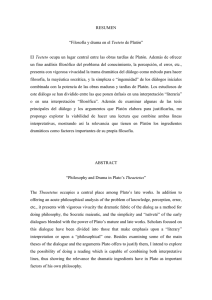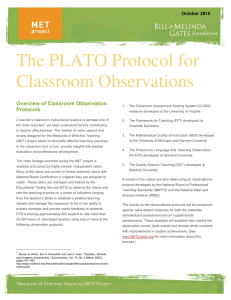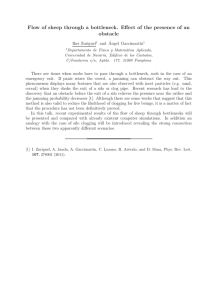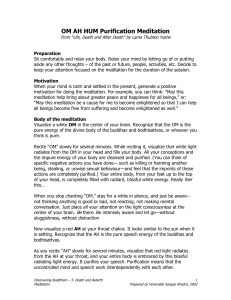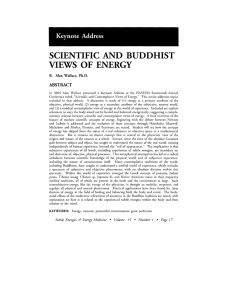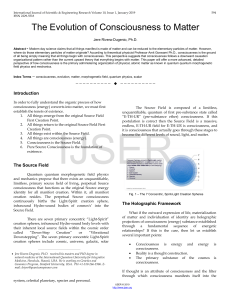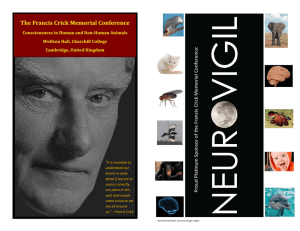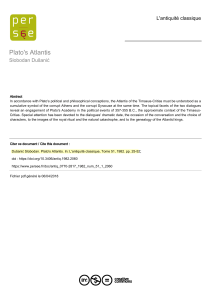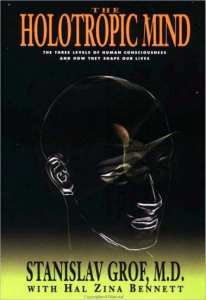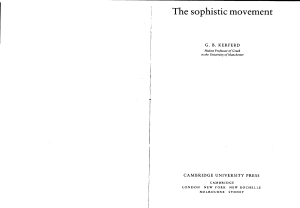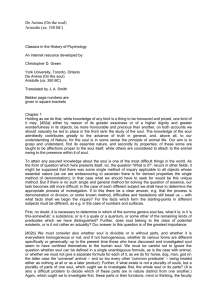references to the states of inspired consciousness in plato
Anuncio
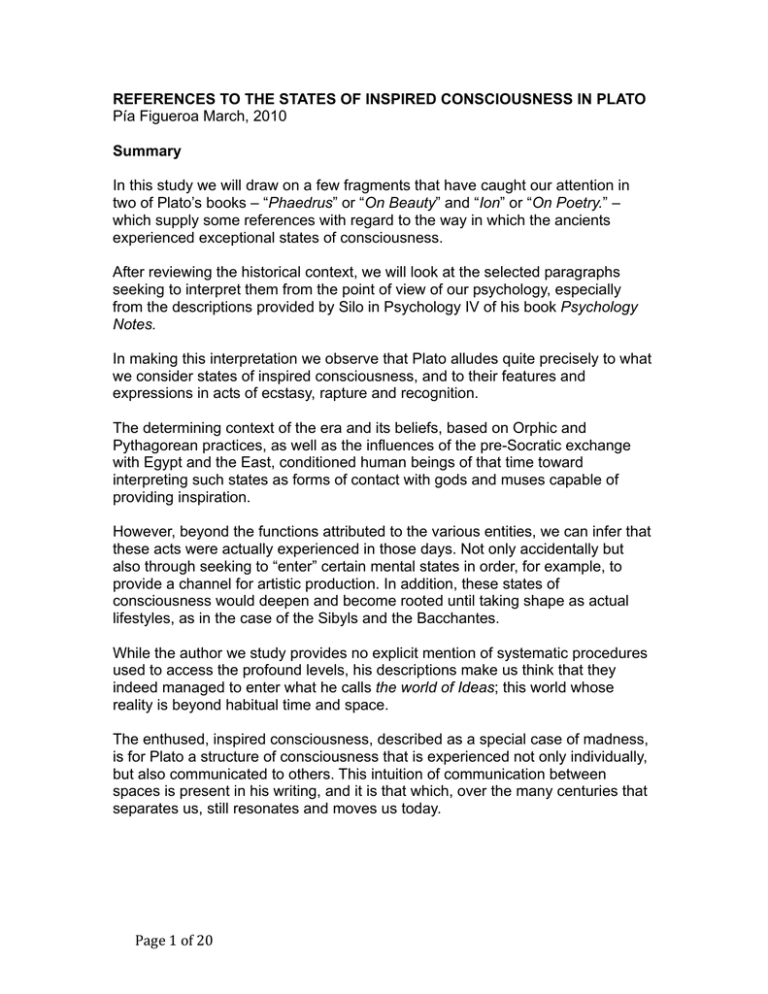
REFERENCES TO THE STATES OF INSPIRED CONSCIOUSNESS IN PLATO Pía Figueroa March, 2010 Summary In this study we will draw on a few fragments that have caught our attention in two of Plato’s books – “Phaedrus” or “On Beauty” and “Ion” or “On Poetry.” – which supply some references with regard to the way in which the ancients experienced exceptional states of consciousness. After reviewing the historical context, we will look at the selected paragraphs seeking to interpret them from the point of view of our psychology, especially from the descriptions provided by Silo in Psychology IV of his book Psychology Notes. In making this interpretation we observe that Plato alludes quite precisely to what we consider states of inspired consciousness, and to their features and expressions in acts of ecstasy, rapture and recognition. The determining context of the era and its beliefs, based on Orphic and Pythagorean practices, as well as the influences of the pre-Socratic exchange with Egypt and the East, conditioned human beings of that time toward interpreting such states as forms of contact with gods and muses capable of providing inspiration. However, beyond the functions attributed to the various entities, we can infer that these acts were actually experienced in those days. Not only accidentally but also through seeking to “enter” certain mental states in order, for example, to provide a channel for artistic production. In addition, these states of consciousness would deepen and become rooted until taking shape as actual lifestyles, as in the case of the Sibyls and the Bacchantes. While the author we study provides no explicit mention of systematic procedures used to access the profound levels, his descriptions make us think that they indeed managed to enter what he calls the world of Ideas; this world whose reality is beyond habitual time and space. The enthused, inspired consciousness, described as a special case of madness, is for Plato a structure of consciousness that is experienced not only individually, but also communicated to others. This intuition of communication between spaces is present in his writing, and it is that which, over the many centuries that separates us, still resonates and moves us today. Page 1 of 20 11 REFERENCES TO THE STATES OF INSPIRED CONSCIOUSNESS IN PLATO 1. INTRODUCTION This study is not referred to Plato’s vast literary output1, to his thinking or his philosophical developments. Our interest is very limited. We want to draw on some fragments in his books that have caught our attention and which refer to the manner with which these exceptional states of consciousness were explained in antiquity. We believe that perhaps, through this study of certain of his texts, we can approach an understanding of how they experienced and understood these altered states of consciousness – states which present similarities to madness or drunkenness and which, in the light of our doctrine, we can now clearly establish as inspired states. What interests us is knowing whether the subjects were able to distinguish those states from others that were more commonplace, and how they valued these states; whether they regarded them as "anomalies" of consciousness or if they were able to produce these fits of inspiration; whether it was a matter of fleeting “non-habitual” events or rather that these states became rooted, or even more, that with the passing of time they developed in their abnormality. To approach the understanding that Plato might have had with what we today call inspired consciousness, we have taken a few paragraphs of two of his early dialogues: Phaedrus, or On Beauty, and Ion, or On Poetry, and sought to interpret them from the point of view of our psychology, especially the descriptions provided by Silo in Psychology Notes IV. Following the texts, it will be Plato himself who deals with establishing the relationships between these extraordinary mental states and other ones. Finally, while his paragraphs illustrate a lot about the time, or the greater context that was operating, we have begun by situating ourselves in that historical moment to get a better understanding of the conditions in which those altered states of consciousness were given. 2. HISTORICAL CONTEXT Plato lived between the 5th and 4th centuries BCE. At that time, Greece was a cluster of self-governing independent city-states located in the Peloponnese Peninsula, Magna Graecia (Southern Italy), Sicily, and numerous islands in the Mediterranean. The Peloponnesian War that had shaken the peninsula ended in 404 BCE. It left Athens and other Greek cities eroded by a series of political, religious and moral crises that threatened the very foundations of the social structure. Socrates had identified the main causes of this collapse as the relativism of the Sophists and a generalized skepticism.2 Page 2 of 20 22 Finally, the rule of the Thirty Tyrants was imposed on Athens. These were the most turbulent years of the city’s political life. Plato was 24 years of age and his cousin Critias and his uncle Charmides formed part of that government. Invited by his relatives, Plato hesitated to accept the position offered him by those in power and, impressed by the teachings of Socrates, decided not to get involved in politics. The Thirty developed a violent crackdown on freedoms leading to Thrasybulus' rebellion and the restoration of democracy. It was Anito, a friend of Thrasybulus, who accused Socrates of corrupting youth, for which he was sentenced to death in the year 399 BCE. It was these events, along with the master-disciple relationship with Socrates, which determined the turning point in the direction of Plato’s life.3 He first took up Socratic thinking on the subjects of virtue, self-knowledge and the discipline of faculties of the soul. Later travelled to Megara where he remained for about three years and met Euclid. Accompanied by Euripides, he then continued to Egypt and Italy where he contacted certain Pythagoreans whose influence was to be considerable, bringing Plato to the themes of pre-existence, immortality, the transmigration of the soul, the communal life of philosophers, cosmological issues, and the importance of mathematics, music, etc. Plato endeavored to complete the teachings of his master, resorting to mathematics in his striving to provide a scientific foundation for knowledge. His fascination with the Pythagorean idea of universal unity, of the immutable order of the cosmos and the harmony that governed both the course of the planets as well as the musical scale, led him to formulating his theory of ideas, immutable and unearthly archetypes of earthly realities. With these, Plato was responding to the Sophists and Skeptics: objective knowledge is possible, since it is based on pre-existing and eternal models.4 He went to Sicily in 366 BCE, where during the reign of the two Dionysius’ in Syracuse, he tried to test his political project of a State ruled by philosophers, organized under laws of justice and harmony. However, having criticized the scandalous and ostentatious life of the court, he ended up being sold as a slave by Dionysus and had to be rescued by his friends in order to return to Athens. At the time, the city-state of Athens was a place of convergence that offered, and required, ideas and beliefs of the most diverse backgrounds. The beliefs of the time were rooted in Orphic and Pythagorean practices, the influences of the preSocratics, and the interchange with Egypt and the East. To the polis went the most prominent doctors, artists and philosophers who devotedly invoked their gods.5 Art reached its maximum splendor with Pericles. The architects Ictinus and Callicrates erected the Parthenon in marble, and to complete its Doric Page 3 of 20 33 refinements, Phidias created the famous sculptures with which it was decorated. Sophocles presented his tragedies and Aristophanes his comedies. The fame and influence of Delphi was so great that all of Greece went to consult the oracle about politics, law and personal conduct, as well as to participate in Delphi’s celebrations and ceremonies in honor of Apollo and Dionysus. It was a powerful center for the consolidation of the Greek states.6 In 387 BCE, Plato, inspired in part by the Pythagorean philosophic communities, founded the Academy in a location sacred to the hero Akademos and located on the road to Eleusis. From then on, his life was largely dedicated to philosophy and the development of the theory of Ideas that served as background for all the other subjects he dealt with. He did, however, return twice to Syracuse in the hope of implementing his ideas on the State. These attempts left him embroiled in a difficult situation and finally imprisoned, returning on both occasions to Athens thanks to the mediation of his friends. Plato also taught in the Academy. He was interested in cosmology and history, and captured his thoughts in literary creations. At eighty-one years of age, still in full possession of his faculties, he died during a banquet. A generation after his death, the Greek city-states fell before the vertiginous advance of Alexander the Great. It was one of those moments in world history when the end of one world is almost completely intermixed with the beginning of a new type of civilization: in this case, the one that developed during the Hellenistic period.7 3. First Text: Phaedrus or On Beauty …the greatest of goods come to us through madness, provided it is bestowed as a divine gift. The prophetess at Delphi no less, and the priestesses at Dodona do many fine things for Greece when mad, both on a private and public level, whereas when sane they do little or nothing; and if we speak of the Sybil, and of others who by means of inspired prophecy foretell many things to many people and set them on the right track with respect to the future we would spin the story out by saying things that are obvious to everyone. (Rowe p.23) But it is worthwhile adducing this point: but among the ancients, too those who gave things their names did not regard madness as shameful or a matter of reproach; for otherwise they would not have connected this very word with the finest of the sciences, that by which the future is judged, and named it the “manic” art. No, they gave it this name thinking madness a fine thing when it comes by divine dispensation; whereas people now crudely throw in the exta “t” and call it “mantic”. (Rowe p.24) Page 4 of 20 44 …So the ancients testify to the fact that god-sent madness is a finer thing than man-made sanity… But again in the cases of the greatest maladies and sufferings that occur in certain families from some ancient causes of divine anger, madness comes about in them and acts as interpreter, finding the necessary relief by recourse to prayers and forms of service to the gods; as a result it hits upon secret rites of purification and puts the man who is touched by it out of danger for both the resent and the future, so finding a release from his present evils for the one who is rightly maddened and possessed. (Rowe p.24) A third kind of possession and madness comes from the Muses: taking a soft, virgin soul and arousing it to a Bacchic frenzy of expression in lyric and other forms of poetry, it educates succeeding generations by glorifying myriad deeds of those of past; while the man who arrives at the doors of poetry without madness from the Muses, convinced that after all expertise will make him a good poet, both he and his poetry – the poetry of the sane – are eclipsed by that of the mad, remaining imperfect and unfulfilled. All these and still more are the fine achievements I can relate to you of madness that comes from the gods. (Rowe pp.24-25) …All soul is immortal... For all body which has its source of motion outside itself is soulless, whereas that which has it within itself, from itself, is ensouled, this being the nature of soul; and if this is the way it is – that that which moves itself is nothing other than soul – then soul will necessarily be something that neither comes into being or dies. (Rowe p.26) This region is occupied by being which really is, which is without colour or shape, intangible, observable by the steersman of the soul alone, by intellect, and to which the class of true knowledge relates. Thus because the mind of a god is nourished by intellect and knowledge unmixed, and so too that of every soul which is concerned to receive what is appropriate to it, it is glad at last to see what is and is nourished and made happy by gazing on what is true, until the revolution of the whole brings it around in a circle to the same point. In its circuit it sees justice itself, sees self-control, sees knowledge – not that knowledge to which coming into being attaches, nor the knowledge that strangely differs in different items among the things that we now say are, but that which is in what really is and which is really knowledge…(Rowe pp.27, 28) …The cause of their great eagerness to see the plain of truth where it lies is that the pasturage that is fitting for the best part of the soul really comes from the meadow there, and that it is the nature of the wing that lifts up the soul to be nourished by this. (Rowe p.28) A human being must comprehend what is said universally, arising from many sensations and being collected together into one through reasoning; and this is a recollection of those things which our soul once saw when it travelled in company Page 5 of 20 55 with god and treated with contempt the things as they now say are, and when it poked its head up into what really is. (Rowe p.30) …Thus if a man uses such reminders rightly, being continually initiated in perfect rites, he alone achieves real perfection and standing aside from human concerns, and coming close to the divine, he is admonished by the many for being disturbed, when his real state is one of possession which goes unrecognized by the many. (Rowe p.30) Well then, this is the outcome of my whole account of the fourth kind of madness – the madness of the man who, on seeing beauty here on earth, and being reminded of true beauty, becomes winged and, fluttering with eagerness to fly upwards but unable to leave the ground, looking upwards like a bird, and taking no heed of the things below, causes him be regarded as mad: the outcome is that this in fact reveals itself as the best of all the kinds of divine possession and from the best of sources for the man who is subject to it and shares in it, and it is when he partakes in this madness that the man who loves the beautiful is called a lover. For as has been said every soul of a human being has by the law of its nature observed the things that are, or else it would not have entered this creature, man; but it is not easy for every soul to gain from things here a recollection of those other things… …Few souls are left who have sufficient memory…(Rowe p.30) In these paragraphs, Plato distinguishes between various types of madness according to the manner in which they are expressed (as divination, purification, as artistic inspiration, or as the state or remembrance of the state, of love). It is notable how in all these cases the internal state is described as one of possession – as if one was possessed by a god – and this allows him to differentiate mental turmoil from inspiration.8 None of these various cases of madness is described as fleeting, or accidental rapture, but rather as well-rooted structures of consciousness. These even develop into styles of life: like that of the priestess and prophetess whose predictions arose thanks to divinely-inspired prophesy;9 the patients who turned to prayer and ended up with Shamanic-type purifications and rites of initiation; the Bacchic transports expressed as waves; all the forms of poetry of those who are taken by the Muses; and the lifestyle of those who know how to use reminiscence and are continually initiated into the mysteries, separating themselves from the occupations of ordinary folk and devoting themselves to the divine. Obviously in all these examples, inspired consciousness affects the functioning of normal consciousness and no doubt that is why it is related to madness. However, Plato rightly differentiates them according to the connotations of "divine gift," "divine possession", "madness that comes from the Muses” or “that stems from the gods." These are trance states in which there is a displacement of the “I” Page 6 of 20 66 and where the consciousness responds to an intention that is present or, in some cases, an intention that is not present but that acts copresently. As stated in Psychology Notes IV, by Silo, "The Sybil of Cumae, not wishing to be taken by the terrible inspiration, despairs and twists about shouting: 'Already he comes, already the god comes!'. And, almost effortlessly the god Apollo descends from his sacred wood to the deep cave, where he possesses the prophetess. In this case as well as in other cultures, entrance into trance occurs through internalization of the “I” and by an emotional exaltation in which is copresent the image of a god, a force, or a spirit that takes over and supplants the human personality. In cases of trance, the subject is placed at the disposition of an inspiration that permits them to grasp realities, and exercise powers unknown in everyday life.”10 In moments of sanity, says Plato, these outbursts were not produced in the Sibyls, and for human beings of that time, "madness is a beautiful thing of divine origin”, it is a state that is valued personally and socially... "things that are obvious to everyone”. This is its clear difference with other mental states where such inspiration is missing and where instead only normal, common and ordinary vigil operates, out of which nothing very interesting arises: "…while the man who arrives at the doors of poetry without madness from the Muses, convinced that after all expertise will make him a good poet, both he and his poetry – the poetry of the sane – are eclipsed by that of the mad…”(Rowe pp.23, 25) Indeed, the Greeks believed that madness could be a gift from the gods granted to few, a form of enthusiasm.11 "…god-sent madness is a finer thing than manmade sanity…” The inspired consciousness is understood as a source of good, "the greatest goods come to us from madness”, of liberation, awakening and creation. " All these and still more are the fine achievements I can relate to you of madness that comes from the gods... " (Rowe p.23) Not only this, but also found in the inspired state is the capacity to recognize "justice, temperance, and all the other things precious for the soul”. This is also true of love; "when he partakes in this madness the man who loves the beautiful is called a lover." This refers in some way to experiences very close to what we would typify as illuminations close to ecstasy, or uncontrollable agitation known to us as rapture, as well as sudden comprehensions proper to the acts of recognition. But it seems to us that in these lines of the Phaedrus, one can also detect a description that is fairly close to the experiences of entering the profound states from the suspension of the I. "This region is occupied by being which really is, which is without colour or shape, intangible, observable by the steersman of the soul alone, by intellect…” (Rowe p.27) Page 7 of 20 77 Direct intuitions produced by mental acts which suspend all representation and perception, a quieting of the consciousness that places the I in a state of suspension, experiences of the sacred with registers of certainty, translations of deep impulses, a kind of perception that is different from the known, and "reminiscences" of that infinite space from which he drank. “For as has been said every soul of a human being has by the law of its nature observed the things that are... …but it is not easy for every soul to gain from things here a recollection of those other things… …Few souls are left who have sufficient memory…” (Rowe p.30) It does not seem that he was describing an occasional state that irrupts fleetingly, and without knowledge of procedures that allow one to return and re-take this particular mental location. On the contrary, he seems to be describing intentional acts of consciousness used to circumvent the presence of the I: "…Thus if a man uses such reminders rightly, being continually initiated in perfect rites, he alone achieves real perfection…" (Rowe p. 30) He appears to be describing a path of inner work firmly mounted in a Purpose, a "great eagerness." "…The cause of their great eagerness to see the plain of truth where it lies is that the pasturage that is fitting for the best part of the soul really comes from the meadow there…” (Rowe p.28) Thanks to this path of internal registers that makes it possible to enter times and spaces that are different from the habitual, "…the mind of a god is nourished by intellect and knowledge unmixed, and so too that of every soul which is concerned to receive what is appropriate to it…” (Rowe p.27) …reaching the immateriality which Plato called Ideas: "In its circuit it sees justice itself, sees self-control, sees knowledge – not that knowledge to which coming into being attaches, nor the knowledge that strangely differs in different items among the things that we now say are, but that which is in what really is and which is really knowledge…" (Rowe p.28) Plato gives us no reference to the procedures of what he calls "perfect mysteries," and indicates only that those who practiced "for as far as it can it is close, through memory, to those things his closeness to which gives a god his divinity.” (Rowe p.30) He does, however, refer clearly to what happens to those who are drawn into these works in their daily lives and in the world of relationships, for which they come to be regarded as mad: “…the madness of the man who, on seeing beauty here on earth, and being reminded of true beauty, becomes winged and, fluttering with eagerness to fly upwards but unable to leave the ground, looking upwards like a bird, and taking no heed of the things below, causes him be regarded as mad…”(Rowe p.30) Page 8 of 20 88 It is precisely the distance from the “things of this Earth” of this earth," this contrast between daily concerns proper to the activities controlled by the I, and the "winged" experience produced by the suspension of the I and the expansion of that suspension, that seems to demonstrate the ability to access profound states, with their inspiring correlates. He even classifies these forms of entry into the profound levels as of the greatest interest: “This is, therefore, before all other forms of divine possession, the best, and constituted of the best elements."* The well-established and developed raptures of inspiration are more than evident even when the mode of entering them is not described. But the diverse expressions of inspired consciousness allow us to deduce that this alludes to the phenomena of consciousness that we know and have defined as access to the profound levels. 4. SECOND TEXT: Ion, or On Poetry …This is no art in you to speak well about Homer; no, some divine power is moving you, such as there is in that stone that Euripides called the Magnesian, but most people call it the Heracleian stone. This magnet attracts iron rings and not only that, but puts the same power into the iron rings, so that they can do the same as the stone does; they attract other rings, so that sometimes there is a whole long string of these rings hanging together, and all depend for their power on that one stone. So the Muse not only inspires people herself, but through these inspired ones others are inspired and possessed when they utter all these beautiful poems, and so are the good lyric poets; these are not in their right mind when they make their beautiful songs, but they are like Corybants out of their wits dancing about. As soon as they mount on their harmony and rhythm, they become frantic and possessed; just as the Bacchant women, possessed and out of their senses, draw milk and honey out of the river, the soul of these honeysingers does just the same as they say themselves. The poets, as you know, tell us that they get their honey-songs from honey-founts of the Muses, and pluck from what they call Muses’ gardens, and Muses’ dells, and bring them to us, like honeybees, on the wing themselves like the bees; and what they say is true. For the poet is an airy thing, a winged and holy thing; and he cannot make poetry until he becomes inspired and goes out of his senses and no mind is left in him; so long as he keeps possession of this, no man is able to make poetry and chant oracles. Not by art, then, they make their poetry with all those fine things about all sorts of matters – like your speeches about Homer – not by art, but by divine dispensation; therefore, the only poetry that each one can make is what the Muse has pushed him to make, one ecstatic odes, one hymns of praise, one songs for dance or pantomime, one epic, one satiric iambic; in every other kind each one of them is a failure. For not by art do they speak these things, but by divine power, since if an art taught them how to speak well in one kind they could do it also in all other kinds. Therefore God takes the mind out of the poets, and uses them as his servants, and so also those who chant oracles, and divine seers; because he Page 9 of 20 99 wishes us to know that not those we hear, who have no mind in them, are those who say such precious things, but God himself is the speaker, and through them he shows his meaning to us. A very strong piece of evidence for the argument is Tynnichos of Chalcis, who never made one poem which a man would think worth mentioning except only the hymn of praise which all the world sings, well-nigh most beautiful of all lyrics, really and truly “a godsend from the Muses” as he calls it himself. Here most of all I think God has shown us, beyond all dispute, that these beautiful poems are not human, not made by man, but divine and made by God; and the poets are nothing but the god’s interpreters, possessed each by whatever god it may be. Just to prove this, God purposely sang the most beautiful songs through the meanest of poets… (Rouse pp.9-10) When you speak your verses well, and astound the audience most… are you in your right mind then, or do you get beside yourself, does your soul feel inspired…And do you know that you reciters make most of the audience do the very same? (Rouse p.11) Then do you know that the member of the audience is the last of those rings which I described as getting power from each other through the magnet? You the reciter and the actor, are the middle ring, and the first is the poet himself; but God through all these draws the souls of men withersoever he will, by running the power through them one after another. It’s just like the magnet! And there is a great string of choristers and producers and under-producers all stuck to the sides of these hanging rings of the Muse. And one poet hangs from one Muse and another from another—we call it “possessed,” and it is very like that, for he is held fast through the poet. And you are one of them, Ion’ you are possessed through Homer; and whenever someone recites who belongs to another poet, you go to sleep and have nothing to say but whenever someone chants a melody of this poet, you are awake in a jiffy and your soul dances and have plenty to say; for it is not by any art or science of Homer that you say what you say, but by divine dispensation and possession. (Rouse p.12) In these paragraphs from Ion, Plato clearly refers to the inspired state and attempts to explain it as a vehicle in which the one who experiences it is pulled or taken out of themselves, taken by entities such as the Muses or Gods, that is, taken by "something" that is not the usual “I”. In this state of trance, the subject is capable of producing extraordinary things: composing beautiful poems, dithyrambs, elegies, epic verse, speaking as an oracle, or dancing with harmony and rhythm, in a state similar to drunkenness that "draws milk and honey out of the river". "It is not through art, but through enthusiasm and inspiration, that good epic poets compose their beautiful poems." They can compose their poems precisely thanks to the particular state of consciousness in which they “place” themselves. It is thanks to a particular mental state out of which arises the phenomenon of inspiration. Page 10 of 20 1 10 However, when the inspiration is lacking, they are "incapable of producing when enthusiasm does not carry them out of themselves." Sometimes the state of inspiration works, and sometimes it does not. They must be disposed to achieve inspiration. “The poets, as you know, tell us that they get their honey-songs from honey-founts of the Muses, and pluck from what they call Muses’ gardens, and Muses’ dells, and bring them to us, like honeybees, on the wing themselves like the bees..." seeking to enter that particular frequency since "… he cannot make poetry until he becomes inspired and goes out of his senses and no mind is left in him; so long as he keeps possession of this, no man is able to make poetry and chant oracles..." (Rouse p.9) That willingness to enter another space, to go to feed on that which can put them in the correct frequency in order to compose, to create, is well explained by Silo: "Literary and plastic artists, musicians, dancers and actors have all tried to connect to non-habitual mental and physical environments seeking inspiration. The various artistic styles which respond to epochal conditions are not simply fashions or ways to generate, capture, or interpret the artistic work, but rather ways of "preparing oneself" to receive and to give sensory impacts. This "disposition" modulates the individual or collective sensibility and is, therefore, the one pre-dialogical that permits us to establish communication esthetics".12 Plato allegorizes the inspired state with the image of "that stone that Euripides called the Magnesia", i.e. the magnet. And the “magnet attracts iron rings and not only that”, bringing them irresistibly to the location of the magnetic stone, “but puts the same power into the iron rings, so that they can do the same as the stone does; they attract other rings". In other words, magnetizing in turn the pieces with which it comes in contact. It becomes able to attract, like other magnets, new rings with which the magnetic stone is not in direct contact, “so that sometimes there is a whole long string of these rings hanging together, and all depend for their power on that one stone.” (Rouse p.9) This explicit reference to the inspired state's ability to attract and establish harmony with other consciousnesses that have not necessarily attained exceptional experiences, but which can also be placed in a situation of inspiration and may even in turn communicate it to others, is a very interesting indicator because it enables us to infer that communication between the space of representation of oneself and others is possible, that communication between different spaces can take place. This communication is established beyond the limit or "membrane" that separates, but also communicates one’s own space of representation with the "world". It corresponds to an inclusive view of oneself and the world; with a look that is located at a distance from the usual position of the “I” in that space. It can be understood that in poetic or mystical vision, there is an emplacement that is aware of the "boundary" between "internal" and "external." Page 11 of 20 1 11 It can also be understood that the very functioning of the psychism allows one to resonate with stimuli that come from the behavior of others. These are not indifferent but mutually influential internal acts that we all externalize in our conduct.13 Or you can allegorize this communication of space of representation with space of representation as a "spark" of inspiration that manages to light the tinder, passing as incipient fire to some other material that is close at hand and which has the attributes needed to allow it to ignite. The inspired state, like the spark that ignites, passes from one to another, illuminating different spaces. These intuitions concerning the communication of spaces, which internal experience can prepare one to register, are detectable between the lines of the quoted texts. It is as if Plato's intuition of the mutual implication given between one’s own space of representation and that of the others – the connection established across the boundary or "membrane" through which stimuli come and go, allowing acts to be put in motion from the internal space reaching the world and modifying it, acting on it – had for him constituted a significant and relevant experience. It is as if he had also understood the other side of the same coin: that the stimuli from the outside world can reach the internal space and modify it, favorably or unfavorably, influencing it for good or for ill. In other words, he would have had the experience that allows him to claim that reality is one: internal and external, and that this reality is a structure. This structure is what Plato considered an "idea", which was the only "reality". This is why such a vision was referred to as "realist". It was the realism of ideas and not an idealism as one might have thought on first approach.14 Our author is not one to affirm the illusory consideration of "separateness" between the “I” and the world; on the contrary, to put things this way is to take as a given the possibility of establishing the communication of spaces as interaction between the consciousness and the world. This communication is what allows the listener to vibrate at the same tone as the one who recites; registering – like him – the emotional charges related to the meanings of the verses. Without the inspired poet who wrote them being present, the contents go and act, modifying the listener’s space of representation. Just as we are inspired today by his writings, made so many centuries ago, so the verses of Homer managed to move those who heard them recited by an inspired interpreter. Inspired consciousness, as a complete structure of consciousness, can be seen as something personal but also as something groupal, or social. In Psychology Notes, Silo explains that: “The different ways of being a human being in the world, the various circumstances of experience and doing, Page 12 of 20 1 12 correspond to complete structurings of consciousness. Thus: the "unhappy consciousness", the "anguished consciousness", the “emotional consciousness", the "disgusted consciousness", the "nauseated consciousness", the "inspired consciousness", are prominent cases that have been well described. It is pertinent to note here that such descriptions can apply to the personal, the groupal and the social. ...the previously cited cases can be understood individually or as an assemblage (in consideration of the intersubjectivity constitutive of the consciousness).” 15 For Plato, "the muse inspires poets, and they communicate to others their enthusiasm, and so a chain of inspiration is formed”*. We enter collectively into a structure of consciousness that communicates from one to another. "But God through all these (rings) draws the soul of men withersoever he will, by running by running the power through them one after another. It’s just like the magnet! And there is a great string of choristers, and produces and under-producers all stuck to the sides of these hanging rings of the muses. (Rouse p.12) We believe that at the time in which Plato lived, artistic expression, the raptures of the poet or the musician and their ability to transport others and communicate the inspired state, were understood in a context in which the origin of this extraordinary phenomenon was attributed to the experience of the sacred, the experience of contact with the Muses or the gods. In this sense, the context of the epoch determines the interpretation of the phenomenon characterized as "divine inspiration" capable of "possessing one", of "taking" the consciousness in a situation in which reversibility and self-criticism are practically annulled, as much in the artist, as with the Bacchante and the Pythoness. 5. CONCLUSION. In the pre-Hellenistic period, Athens was seriously strained by political and social events that coexisted with enormous developments in all fields of the arts as well as philosophy. It was one of those special moments in world history when one world ends and a new type of civilization begins.16 Plato goes beyond the Socratic view. The paragraphs we have considered for this study, drawn from his "Phaedrus" and "Ion," have provided us with points of reference regarding exceptional states of consciousness and how they work The determining context of the time with its beliefs based on Orphic, and Pythagorean practices along with the influences of the pre-Socratics, and the interchange with Egypt and the East, conditioned the human being to interpret such states as forms of contact with gods and muses able to provide inspiration. Page 13 of 20 1 13 However, beyond the powers granted by the various entities, Plato describes the state of inspired consciousness quite accurately, as well as its characteristics and expressions in acts of rapture, ecstasy and recognition. Thanks to this, we can infer that these acts were indeed experienced in those times; not only accidentally but also through seeking to "put oneself” into certain mental states in order to be a conduit for artistic production, for example. In addition, these states of consciousness, were deepened and took root, constituting true modes of life as in the case of the Sibyls and the Bacchantes. While the author we are studying provides no explicit mention of the systematic procedures used to access the profound levels, his descriptions make us think that they did enter what he called the world of Ideas – that world whose reality is beyond the usual time and space. Inspired, enthused consciousness, described as a special kind of madness, is for Plato a structure of consciousness that is experienced not only individually, but also communicable to others. This intuition of intersubjectivity constitutive of the consciousness, of the communication between space of representation and space of representation, is present in his writing and it is that which over the many centuries that separate us, still resonates and moves us today. It is not only his formidable literary skills, or his precise philosophical intuitions that we find significant when we approach his texts. It is precisely their ability to communicate the inspiration of a time in which access to the profound levels appears to have been a phenomenon desired and experienced.18 Page 14 of 20 1 14 English Sources for Plato • Plato, Phaedrus, Tr. C. Rowe, Penguin Books, 2005 • Plato, Timaeus and Critias. Translated by Desmond Lee. Penguin Books, 1977. Original Spanish Bibliography • “Fedro, o de la Belleza”, Platón, Edit. Aguilar, Buenos Aires, 1960, the whole book, especially from page 63 to 73. • “Fedro”, Platón, Instituto de Estudios Políticos, Madrid, 1970, the whole book, especially from page 24 to 32. • “Ión, o de la Poesía”, Platón, Edit. Aguilar, Buenos Aires, 1960, the whole book, especially from page 10 onwards. • “La República”, Platón, Ediciones Ercilla, Santiago de Chile, 1941, page 7 • “Timeo”, Platón, Ediciones Colihue, Buenos Aires, Argentina, 1995, page 101 • “Historia de la Filosofía”, Julián Marías, Edit. Emecé, Buenos Aires, 1954, pages 41 to 56 • “Atlante illustrato di Filosofía”, Ubaldo Nicola, Edit. Demetra, Prato, Italia, 1999, page 108. • “Grecia – de Micenas al Partenón”, Henri Stierlin, Taschen, Madrid, Spain, 2004, pages 219 to 227. • “Historia de la Filosofía en su marco cultural”, César Tejedor Campomanes, Ediciones SM, Madrid 1995, pages 10 to 16 and pages 40 to 56. • “El Templo – el espacio sagrado de la caverna a la catedral”, E.O. James, Ediciones Guadarrama, Madrid, 1966, pages 224 to 227 • “Apuntes de Psicología”, Silo, Ulrica Ediciones, Argentina, 2006, pages 304 to 344. • “Habla Silo”, recopilación, Virtual Ediciones, Santiago de Chile, 1996, page 23. • Monografía “Antecedentes de la disciplina Morfológica”, Mariana Uzielli, pages 67, 68 and 69 www.silo.net English bibliography E. O. James, From Cave to Cathedral, Frederick A Praeger, New York and Washington, 1965 pp.248-251 Silo. Notes on Psychology www.silo.net. Monograph, "Antecedents of the Morphological Discipline," (Antecedentes de la disciplina Morfológica), Mariana Uzielli, pp67-69. www.silo.net Page 15 of 20 1 15 FOOTNOTES 1 "Plato's work is almost completely extant. It is, along with that of Aristotle, the foundation of philosophy and all of Greek culture. Furthermore, in the entire Hellenic corpus it is perhaps the greatest in terms of its literary value. It is there that we find the expressions and metaphors adequate for this new way of thinking. Plato's contribution to the formation of philosophical language is incalculable. Plato’s selection of the dialogue as the literary genre in which to express his views reflects a deep relationship with his doctrine of dialectic as a philosophical method, and many of them are of breathtaking poetic beauty. The main character is always Socrates, and it is he who carries the weight of the discussion. The early dialogues, the Apology, the Crito, the Eutheyphro are deeply colored by the influence of Socratic doctrine. Most important among the later dialogues are: the Protagoras, the Gorgas, the Euthydemus (on the Sophists), the Phaedo on the immortality of the soul, the Symposium or Banquet, the Phaedrus on love, where we find his theory soul, and the Republic, on justice and the idea of the state. Finally, the Theaetetus, Parmenides - and perhaps the most important of Plato's writings - the Sophist and the Statesman, and from his later years, the Timaeus, with its references to Atlantis, the Philebus, and a considerable work, the largest in size, and in which Socrates does not appear, The Laws, consisting of a second presentation of the theory of the state. The authenticity of some of the Platonic writings, especially certain of his letters - such as VII - have raised serious doubts and problems. Plato's thought shows an evolution of the Socratic doctrine of Socrates until discovering the ideas and culminates in the discussion of the difficulties and problems raised by these.” Julian Marias, History of Philosophy ", Edit. Emecé, Buenos Aires, 1954, page 41 and 42. 2 Monograph, "Antecedents of the Morphological Discipline," (Antecedents de la disciplina Morfológica), Mariana Uzielli, chapter on Plato, page 67. 3 Plato, The Republic, "Introduction to First Book, Ediciones Ercilla, Santiago de Chile, 1941, page 7. 4 Monograph, "Antecedents of the Morphological Discipline," (Antecedentes de la disciplina Morfológica), Mariana Uzielli, chapter on Plato, page 67. 5 Timaeus: “Yes, Socrates; of course everyone with the least sense always calls on god at the beginning of any undertaking, small or great. So surely, if we are not quite crazy, as we embark on our account of how the universe began, or perhaps had no beginning, we must pray to all the gods and goddesses that what we say will be pleasing to them first, and then to ourselves. Let that be our invocation to the gods: but we must invoke our own powers too, that you may most easily understand and I most clearly expound my thoughts on the subject Page 16 of 20 1 16 before us.” Plato, Timaeus and Critias. Penguin Classics. Translated by Desmond Lee. Penguin Books, 1977. Page 40. 6 "History of Philosophy in its cultural context, (“Historia de la Filosofía en su marco cultural”), César Tejedor Campomanes, SM Ediciones, Madrid 1995, page 42. 7 Monograph, "Antecedents of the Morphological Discipline," (Antecedentes de la disciplina Morfológica), Mariana Uzielli, chapter on Plato, page 68. 8 "Since ancient times there have existed procedures capable of carrying people to exceptional states of consciousness in which the greatest amplitude and mental inspiration is juxtaposed with the dulling of the normal faculties. Those altered states have similarities with dreams, drunkenness, some forms of intoxication and dementia. Frequently the production of these anomalies was associated with personal and animal “entities” or perhaps natural “forces” that were manifested precisely in those special mental landscapes. As the importance of those phenomena began to be understood, explanations and techniques were honed with the intention of giving direction to processes that, in principle, were out of control. Already in historical times in diverse cultures (frequently in the shadow of religions) mystical schools developed that practiced their particular ways of accessing the Profound. Even today, in the material culture, in myths, legends and literary productions, one can recognize fragments of conceptions, as well as group and individual practices, that were very advanced for the times in which these people lived.” Material of School, "The Four Disciplines," Antecedents, p1. 9 "The sanctuary at Delphi on Mount Parnassus was a temenos sacred to Apollo... …the last (sixth) temple was built in 305 B.C. … The omphalos stone of the temple was regarded as the navel of the earth, and was kept in the adytum in which the statue of Apollo was enshrined, erected over the sacred spring where the Pythia, seated on her tripod, gave oracles as the prophetess of Apollo… …Although she was the prophetess of Apollo, and Delphi was essentially an Apolline centre during the Homeric period, nevertheless, from the fifth century B.C. the temple became increasingly associated with Dionysus and by the third century the monument in the inner sanctuary was regarded as his grave. By the time of Plutarch two centuries later, he was believed to have taken the place of Apollo at the shrine during the three winter months when Apollo retired to the north, a tradition that may go back to a much earlier period, since the winter absences were established by the sixth century B.C. Who then presided at the temple is not recorded, but the partnership of Dionysus and Apollo at Delphi had a moderating influence on the Dionysian orgies, though it introduced an ecstatic element in the oracular cultus. But the inspiration of the Pythia took a different form from that manifested in the Thraco-Phrygian frenzies. Taking her seat on the tripod in the adytum over the vaporous cleft in the chasm below, or occasionally herself entering the cave, the words she uttered were interpreted by the ‘prophet’ Page 17 of 20 1 17 or chief-priest, and often written down in hexameters as the oracles of Zeus through Apollo with whom she was en rapport. If the original home of the oracle was in Anatolia, it doubtless had an ecstatic background, and the Hyperboreans, with whom Apollo is traditionally associated geographically and etymologically, have northern-Asiatic affinities where the shamanistic tradition was very deeply laid. Therefore, as the cults of Dionysus and Apollo coalesced the prophetess and her oracular utterances at Delphi gave expression to a common tradition in a Greek milieu at the temple of Apollo. When Orpheus, as the hero of the Dionysian cult and the priest of Apollo found a place in this complex oracle under the influence of the Orphic movement, the Dolphins cultivated hero-worship and tendance of the dead. As a result the gulf between mortals and immortals was bridged by metempsychosis and teletae… …So great, in fact, became the fame and influence of Delphi that all Greece resorted to it for information on cult procedure, politics, law and personal conduct in everyday affairs, however vague and evasive the responses often might be, especially on critical questions. Nevertheless, it held the allegiance of the entire nation, rulers, statesmen, sages, citizens and athletes who assembling periodically at the sacred precincts, its temple stadium and theatre, to take part in rites and games held in honor of the Pythian Apollo. Thus, Delphi became a potent consolidating centre in the Greek states, the Pythia and her officials the Exegetai Pythochretoi, occupying a unique position, Apollo through them saying the last word in answer to oracular inquiries on religious, legal, statutory and personal procedure, especially at time of crisis. By the sixth century B.C. he was the chief standardizing agency in the religious and social structure in Greece, with Delphi as the omphalos. A raid on the sanctuary by the Persians in 480 B.C. was said to have been frustrated by Apollo, who in a storm or earthquake hurled rocks on the invaders. But early in the fourth century the temple seems to have been destroyed by the Phocian defenders of Delphi during the second Persian war (357-346 B.C.), when many of its treasures were melted down. This sacrilege had to be recompensed by annual payments of ten thousand talents, but it ceased to occupy its focal position as the pan-Hellenic sanctuary when they were defeated by Philip of Macedon, though the oracle supported him and his successor, Alexander the Great. Thus, Delphi became a powerhouse consolidator of the Greek states, occupying the Pythia and its officials, Exegetai Pythochrestoi, a unique situation; through them Apolo said the last word by answering questions about procedures oracular religious, legal, statuary, especially in times of crisis. By the sixth century A.C. was the main unifying agent in the social structure and religion of Greece, with Delphi as omphalos. It was said that an invasion of the Persians on the sanctuary, 480 BC, was frustrated by Apollo, who, with a storm or earthquake, threw rocks on invaders. But in the fourth century the church seems to have been destroyed by the defenders of Delphi Phocians during the Persian War (357-346 BC), when they cast many of their treasures. This sacrilege was to be rewarded for annual payments of 10,000 talents, but ceased to occupy focal position as Page 18 of 20 1 18 Panhellenic sanctuary when they were defeated by Philip of Macedonia, although the oracle supported him and his successor, Alexander the Great." E. O. James, From Cave to Cathedral, Frederick A Praeger, New York and Washington, 1965 pp.248-251 10 Silo, "Psychology Notes", Psychology IV, pp12-13. www.silo.net 11 "In the history of thought the Platonic notion of enthusiasm has been taken up by all philosophies aimed at overcoming the limits of reality. Medieval mysticism saw this as a variant of religious ecstasy, in the Renaissance, Giordano Bruno gave a secular version and spoke of "heroic frenzy," meaning that the natural enthusiasm (fervor for the truth) should characterize the investigation of the philosopher. In the modern era, Romanticism revisited the sense of Platonic thought in the madness discovering the merits of the human spirit, its most ancient and profound reason but cannot abolish controls. " Ubaldo Nicola, "Atlante di illustrated Philosophy", Edit. Demetra, Prato, Italy, 1999, page 108. 12 Silo, "Psychology Notes, Psychology IV, p.10 www.silo.net 13 "If I see someone in a very bad state, if I see someone suddenly cut or injured in some way, something resonates inside of me. But how can something that is happening to another person echo inside of me? It seems almost magical! It happens that when someone is in an accident, somehow I experience, almost physically, the register of the accident in that other person. As students of these phenomena, you know that to every perception there corresponds an image, and you understand that there are images that can cause certain points in one’s body to tense up, just as other images can cause them to release tension. If every perception is linked to a representation, and that representation in turn has its register—that is, a new sensation—then it is not so hard to understand how when I perceive a phenomenon there is an internal image that corresponds to that phenomenon. And when that image is mobilized, certain parts of my body or intrabody can experience a corresponding sensation, since they have been modified by the action of that image. I feel “identified” when someone is injured, because the visual perception of that phenomenon is accompanied by the triggering of a visual image and, correlatively, an unleashing of coenesthetic and tactile images. In addition, these images carry with them a new sensation that ends up provoking in me a register of the other’s injury.” Silo, "Valid Action" from Silo Speaks, Collected Works vol. 1, 2003, Latitude Press, p. 569 Page 19 of 20 1 19 14 Monograph, "Antecedents of the Morphological Discipline," (Antecedentes de la disciplina Morfológica), Mariana Uzielli, page 69. 15 Silo, "Psychology Notes, Psychology IV, www.silo.net, pp6-7. 16 Monograph "Antecedents of the Morphological Discipline," (Antecedentes de la disciplina Morfológica), Mariana Uzielli, chapter on Plato, page 68. Page 20 of 20 2 20
